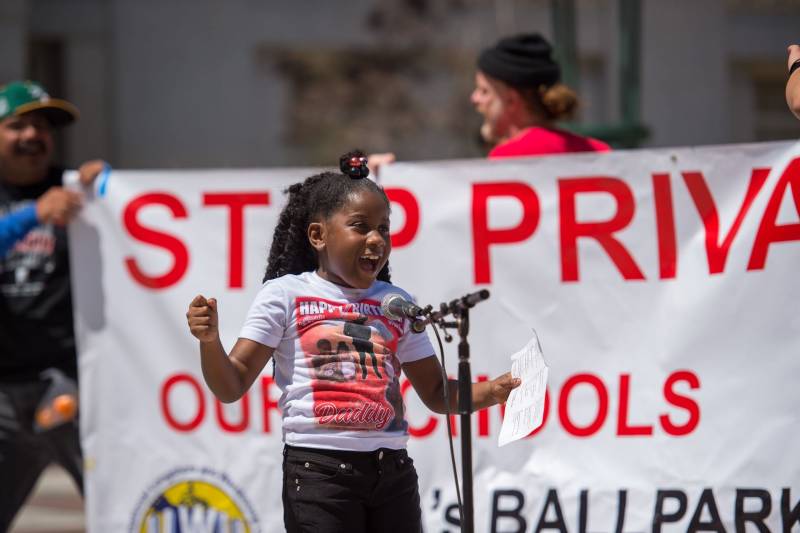“Overwhelmingly the Oakland community in all three school board races during the election made it really clear that they do not want to see any more schools close,” Bachelor said. “So I think we need to make sure those community voices are heard.”
The move also comes at a crucial time for many families in the district, who soon have to decide where to enroll their children next year.
“We’re gonna be the first city of our size in the country to walk back from school closures, to embrace full community control,” said board President Mike Hutchinson, who introduced the resolution to reverse the closures and was an early, outspoken opponent of the original plan.
Hutchinson said he hopes the move will make the enrollment process a little bit easier for families, and will clear the way for the board to fix the harm caused by last February’s divisive vote. That decision sparked student and staff walkouts, an 18-day hunger strike staged by two OUSD staff members, and an inquiry by the state Department of Justice over potential violation of students’ civil rights.
“The goal is not to just save our schools from closure, but the goal has to be to rebuild our schools, to finally make them the high-quality schools across this district that every community wants and deserves,” Hutchinson said.
For nearly three hours, the throng of students, parents and teachers who joined Wednesday’s meeting in person and over Zoom pleaded with board members to stop the closures.
“It shouldn’t be fair,” Olivia, a second grade student at Carl B. Munck Elementary, told the board. “I haven’t been in third grade yet and I don’t want to go to a new school because this school is awesome. I love it.”
At the meeting, Oakland Unified School District Superintendent Kyla Johnson-Trammell urged school supporters to also demand more support from the city and county to help the district address its declining enrollment, which has led to a reduction in state funding. She also said more needs to be done to raise teachers’ pay and offer them and district families more affordable housing options.
“We could double the amount of schools we have, but if we can’t attract folks to be here, we won’t have the staff that we need,” she said. “Secondly, housing. Families are moving out, our staff are moving out because it’s so expensive. That is not a problem that we can solve by ourselves.”
Following the vote, Carl Pezol, father of a third grader at Munck, said he felt overjoyed and relieved.
“It’s been a long year,” he said. “From the hunger strikes to the sit-ins, to the rallies, to the efforts, to the advocacy. There’s a lot of people who put their voice out there and put a lot of effort into this.”
Pezol praised the special education program at Munck, where he said his son is thriving.
“If they were to close that program, it would cause a lot of disruption to him, to a lot of his classmates and to our families,” he said. “Getting into a new school for a disabled kid is not easy. Getting into a new routine, new faces. … It’s just doubly hard when you have other issues to deal with.”
Bachelor said the district must now move quickly to reopen enrollment at the five saved schools, and ensure they all have the proper staffing, since some teachers had already begun looking for work elsewhere.
Hutchinson and board member VanCedric Williams also voted in favor of overturning the closure decision, while Nick Resnick, a third new member, abstained.
Board member Sam Davis, among the minority who voted against the move to rescind the closures, said he wanted to wait for a fiscal analysis of the impact, which won’t be ready until later this month. Davis said he’s worried the district won’t be able to pay its bills over the next few years and finally free itself from state receivership, which it has been under since 2003.
“Many districts with a … similar size to Oakland have 50 to 60 schools while we have 78. That’s the basic math of the situation. That’s why I supported reducing the number of schools,” he said.
But Bachelor argued that instead of closing schools, the district should instead be making cuts to personnel in its central office and to its many costly contracts with outside consultants.
“We need to take a thorough look at how much we’re spending at our central office and how much we’re spending on consultant contracts,” Bachelor said. “Too often we overlook what we can cut or what we can modify in those two spaces, and just go towards our schools and what sites we can close, and I want to change that. I want to shift that dynamic.”
Bachelor also said that she is now considering a push to reopen two schools —Community Day School and Parker Elementary School — located in the East Oakland community she represents that have already been closed as a result of last year’s vote.
“I want to have conversations with those families, those educators and those students to see what kind of program they want to have, where they want to be located and how we can best support them,” Bachelor said. “But my goal would be to reopen those school sites, or reopen those programs to ensure that we’re serving all of our students in all of our different neighborhoods.”

